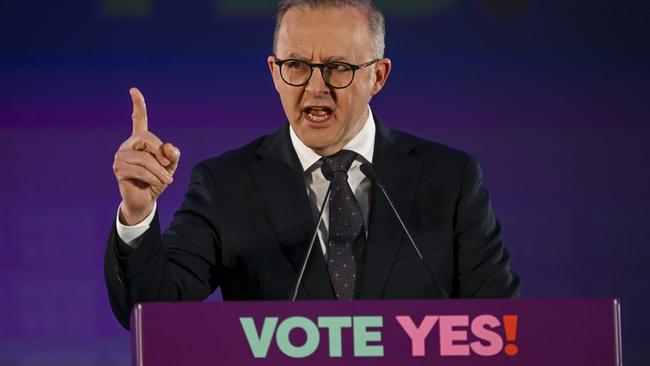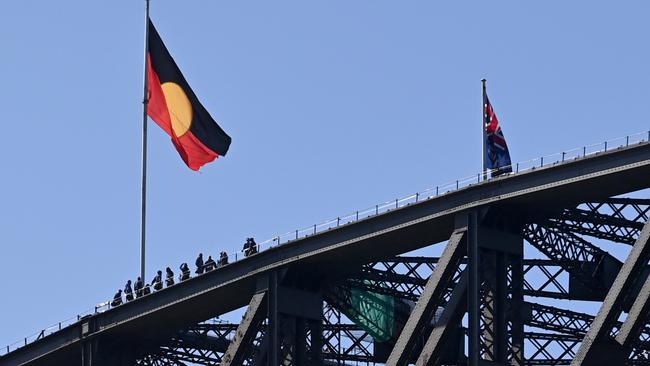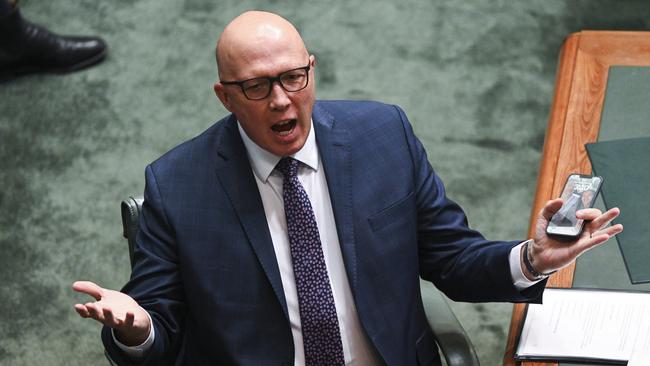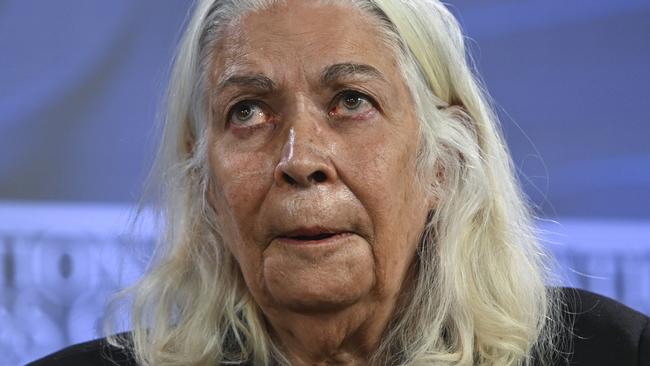‘Have we gone mad?’: Debate over the Voice baffles
Australia’s response to the Voice referendum seems, increasingly, to be set in stone. But it still makes little sense.
National
Don't miss out on the headlines from National. Followed categories will be added to My News.
COMMENT
Returning to Australia this month after half a year away, I expected to find normalcy. At its best our nation is characterised by a laid back common sense, an aversion to nonsense, which is all too rare elsewhere in the world.
There is an air of clueless decay about my current home, Britain, a former imperial power struggling to accept its diminished influence.
The British public service, stodgy and inefficient next to ours, still believes itself the global benchmark. There remains a palpable, almost religious pride in the country’s hopelessly underpaid and underperforming health system. Not so long ago, Brits made a vacant expression masquerading as a leader their prime minister.
In short, our former colonial masters consider themselves a serious, grown-up country while behaving like a volatile adolescent or, perhaps worse, a nation gone ever so slightly senile.
Australia is meant to be the self-assured adult these days, comfortable in its skin, rolling its eyes at the eccentricities and old-fashioned quirks of its ageing parent. And our politics are supposed to skew towards the dull over the absurd.
How dismaying it was, then, to land in the middle of a disingenuous and deeply unedifying debate over the proposed Indigenous Voice to parliament. Are we mad now? Has all sense of perspective been lost? It seems so.

Barring a significant reversal in sentiment, of which there is yet to be even a hint, the Voice referendum on October 14 will fail. This despite the absence of any compelling argument against it.
The No campaign has been immensely, undeniably effective. It is also a torrent of logical leaps and fallacies that unravel under the slightest scrutiny.
Let’s take a few of the arguments in turn. We are told the Voice, if established, will “divide” the country, as though that isn’t true of essentially every political issue before us.
Shall we stop debating tax policy, lest it “divide” the country? Perhaps we should stop holding elections? Very divisive indeed, they are.
Division can be uncomfortable, yes, and if a Voice is created you can expect it to start some deeply uncomfortable debates. Does a mature, functioning nation hide from such debates, or confront them?
Perhaps you’re concerned about a different type of division – the idea that a cohort of Australians will be singled out and treated as distinct. OK, fair enough. But by that logic, you can’t stop at merely opposing the Voice. Follow the principle to its conclusion and you have to get rid of the minister for Indigenous Australians, for one thing. Race is already enshrined in the constitution via the “race power”, so that’ll have to go. And of course, we must ditch any policies targeted specifically at Indigenous people. All those attempts to address their chronic disadvantage are, apparently, unacceptably “divisive”.
This is nonsensical. It’s a vision of government that can’t help anyone, ever, because it limits every policy area to useless generalisations.
The fact is Australia is already divided by race, and we all know it. That much is depressingly evident in all sorts of statistics, from life expectancy to education levels to incarceration rates. There are deep-rooted problems for Indigenous Australians that have thus far withstood all efforts, from governments of every persuasion in Canberra.
The Voice is designed to give the government better advice from the communities in question. That isn’t divisive. It’s how good government typically operates – from the local level up, not from the federal level down.

A significant, underprivileged slice of our society feels as though it is looked down upon; dictated to; disrespected; not listened to.
The Voice would ensure it is, at the very least, listened to. Again, that. Is. Not. Divisive. It would be a unifying act, a signal that yes, we do actually care about Indigenous Australians and want to hear their views.
Rejecting the Voice would send the opposite message. “Oh sure, we want to hear from you, but not like that. Not in the way you want to make yourselves heard.” Whatever nuance you think resides within that position, you must see how many Indigenous Australians would interpret it – as a directive to shut up.
Then we have the classic “slippery slope” argument, a staple of all competent scare campaigns. You have heard opponents of the Voice suggesting it is a Trojan Horse for more ambitious, radical changes. Vote for a Voice, they say, and you’ll get treaty, reparations and God knows what else.
This is a rhetorical trick. When you consider these arguments, remember, their spokesmen are urging you to vote against the Voice, not against treaty. It is entirely possible to support one and not the other, because they are entirely different things.
This really could not be simpler: the Voice would be an advisory body with no power to legislate, fund or impose anything. Parliament would remain sovereign.
So yes, it is entirely possible that the Voice might recommend treaty, or reparations. At which point we will have another public debate on the matter. If parliament decides not to act on the recommendation, nothing happens.
The power to legislate any of the measures you might fear already exists, and the Voice wouldn’t change that. It would merely present us with a position on those ideas from a body that represents Indigenous Australians.
Wow, scary stuff, huh? It takes a skittish soul to recoil at words like “advice” and “consultation”. To perceive a threat in powerless words.

You’ll have heard No campaigners accuse the government of keeping the full extent of its proposal secret – this is the palava over the Uluru Statement from the Heart, and whether it’s just one page or many.
Again, it’s quite simple: the Statement from the Heart is a single page. There’s a much longer report underpinning it, which does express support for measures beyond the Voice. But when you vote on October 14, you’re not being asked to approve every word of that report. You’re giving your verdict on a specific change to the constitution, the extent and language of which have been detailed in full. Here it is.
“In recognition of Aboriginal and Torres Strait Islander peoples as the First Peoples of Australia, there shall be a body, to be called the Aboriginal and Torres Strait Islander Voice. The Aboriginal and Torres Strait Islander Voice may make representations to the parliament and the executive government of the Commonwealth on matters relating to Aboriginal and Torres Strait Islander peoples. The parliament shall, subject to this constitution, have power to make laws with respect to matters relating to the Aboriginal and Torres Strait Islander Voice, including its composition, functions, powers and procedures.”
That’s it. That’s the whole thing. Nothing about treaty or reparations, or anything else. Do you approve of creating an advisory body, whose composition and operation will be determined by parliament? You may say no, but do make sure you’re answering the right question.
The clearest hallmark of a fear campaign is its fixation on straw men. The No side is arguing against ideas that are not on the ballot, because what is on the ballot is inoffensive. The Voice as defined by this referendum cannot hurt anyone, yet may help the chronically disadvantaged in our community. If you are set against this entirely reasonable step because you fear other steps that may or may not follow, somewhere down the road, you have fallen victim to a blatant fallacy.

Now, it is true that we do not have a precise, exhaustive model before us outlining how the Voice will operate day-to-day. Anthony Albanese decided to seek in principle support from the public before working out the full details. I’m prepared to accept that was unwise.
A couple of points, though: first, the proposed Voice can be changed by parliament whenever it wants. The constitution would only require that a Voice exist, with parliament left to design and tweak it as necessary. If Peter Dutton gets into power and doesn’t like how the thing’s operating, he can just change it.
Second, and do excuse my cynicism, how many people truly oppose the Voice because they don’t know how many members it will have, or exactly how they’ll be elected, or how much it will cost?
(For what it’s worth, the aforementioned background papers underpinning the Voice proposal suggested a 24-person body, with members serving four-year terms and being limited to two terms each.)
While writing this, I went to my inbox and opened, at random, a press release from the last election campaign. It pledged $20 million for wineries and breweries to upgrade their cellar doors. I chose another, again at random, and it promised $300 million to support various “minerals projects”.
Governments of both stripes throw around hundreds of millions of dollars all the time, for no better motive than political advantage. Spare us the faux concerns about cost.
How about the model, then? This is not a comparable situation to the republic referendum of the 1990s, which also suffered from the lack of a clear, detailed proposal. In that case, the majority of Australians could fairly conclude “if it ain’t broke, don’t fix it”. Our system of government was functioning well enough, and changing it did present a risk.
This is different. In this case, it is broken, and all previous attempts to fix it have failed. The greatest risk comes in accepting the stagnant status quo; in refusing to change our approach.
Will some radical folks potentially make it onto the Voice? Sure. And Pauline Hanson has been in the Senate for how long? Heck, Mark Latham almost became prime minister, with the endorsement of a major party. Shall we scrap parliament? Abolish the Senate? No, because we have perspective, and understand that any institution cannot be reduced to its extremes.
Some activists would support far more ambitious measures than the Voice. OK. And? Argue against that stuff when it arises, if you dislike it. It isn’t being put forward here.
The proposal before you is clear. Unambiguous. And modest. You’re free to oppose it. But don’t concoct a scarier fiction to soothe your soul. Acknowledge what you’re voting against: a powerless body. The merest whisper of a challenging opinion. Surely we can handle that. Surely we are a grown-up country.
Twitter: @SamClench
Email: samuel.clench@news.com.au
Originally published as ‘Have we gone mad?’: Debate over the Voice baffles


